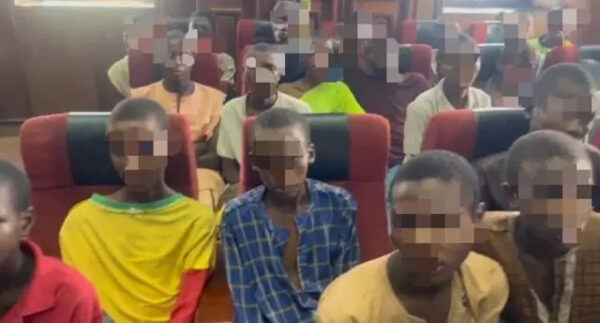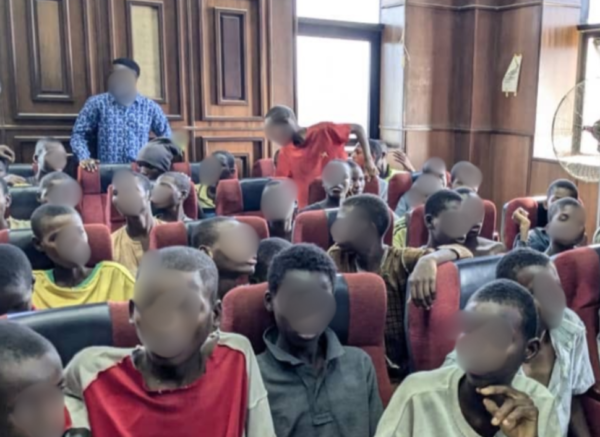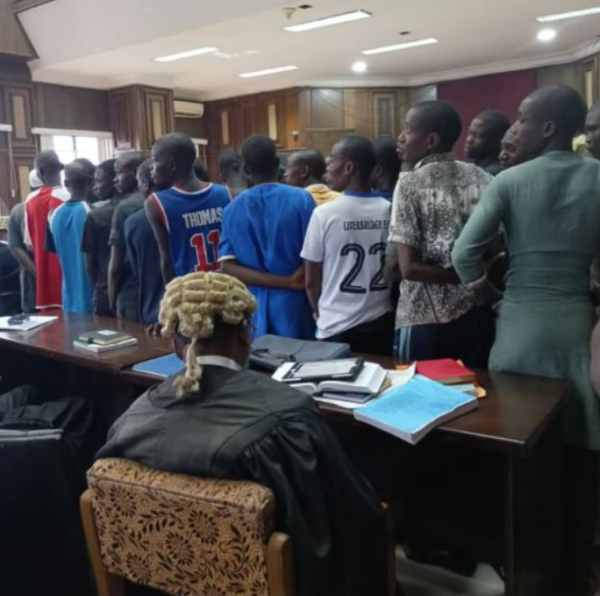By Toyin Falola
When you are a Nigerian, few things astonish you as they would other nationals. But Nigerian or not, the shocking images of minors arraigned at the Federal High Court were undoubtedly not the most anticipated opening to the month of November. The saga began months before, with the ten days of protests scheduled between the 1st of August and the 10th. The teenagers, reportedly between the ages of 12 and 17, had been detained alongside other participants by the police and were subsequently arraigned for trial. The police procured a 60-day remand order from the court, grounding its claim in terrorism charges. Then, there had been little attention, save the usual backlash from civil society like Amnesty International.

With videos emerging in November of collapsing of minors crammed into the dock, clothes hanging loosely around their shoulders, in the courtroom, it was simply impossible to rationalize the prosecution. Worse still, they had been handed humongous bail amounts of ten million naira by the Federal High Court. All these make for a problematic swallow. But my disagreement is quite measured. In commenting here, I have taken the time to read through opinions from various quarters, particularly from the people with the most knowledge of affairs, such as lawyers. So, let me begin with legality.
The Child Rights Act is the principal law governing the rights of children in Nigeria, which provides that a child is anyone under 18. Other laws protecting or governing children’s rights in the country include the Penal Code, the Criminal Code Act, and the Children and Young Persons Act. The Children and Young Persons Act is noteworthy for its historical purpose as legislation governing the format of criminal proceedings for children. Its contents include the trial of children in courts established for that purpose and distinctions between qualifications as a young person and a child. This law has been designated as unnecessarily prescriptive and has rightly been overwritten by the Child Rights Act, which categorically defines a child as someone below 18. Notably, the Penal and Criminal Codes, applicable in the Northern and Southern regions of Nigeria, respectively, have boundaries on the age at which a child may be deemed capable of committing an offence and duly tried for it.
The former considers conduct, not an offence if the so-called offender is a person below age seven or above seven but below age twelve. The latter end of the provision within the Penal Code views children above seven but below 12 as not being liable for an offence if they have not acquired sufficient maturity of understanding to assess the Act and its consequences. Section 30 of the Criminal Code Act deals with immature age; 7 is the minimum age of criminal responsibility. However, for children between the ages of 7 and 12, the prosecutor must prove that the accused minor could know that such an act was something they should not have done. Ultimately, the Criminal and Penal Codes converge on the years a child is trialable and broadly share consensus on the standards required for prosecution. The Child Rights Act stands out as an extensive law on the protection of the rights of the child by determining the frameworks within which children can be brought before the court. It scraps the Juvenile Judicial Administration specified under the Children and Young Persons Act, putting the Child Justice Administration in its stead. The Act similarly provides for establishing a Family Court within whose jurisdiction it is to hear civil and criminal matters relating to children. Also significant is the provision for establishing a specialized police unit tasked with handling children’s cases.

Thus, we see so far that based on the media-reported ages of the children between 12 and 17, it is not unusual for them to have stood trial. However, further analysis of extant laws indicates that their rights to be tried in courts specifically designed for their purpose had been grossly violated by the Nigerian Police Force. Secondly, while the Nigerian Correctional Service has denied admitting minors into facilities designed for older suspects and convicts, the line maintained by the now-released children is that they were kept under dehumanizing conditions, with scant nourishment to keep them going. One child described not going fed for days, while other accounts claimed that they had been held alongside hardened criminals and kept in darkness.
The official police response attempting to discredit this comes up short on details surrounding the children’s detention, particularly the facilities, their locations, and the resources utilized for their care. I doubt delineating these is a strategic risk since the matter at hand threatens its reputation. It hardly helps either that the Inspector-General had written the fainting spells off as a scripted ploy by the minors, neither can a person find relief in the blatant lies told by the prosecuting counsel on camera. The sentiments that led the police to charge children with crimes bearing the death sentence when the most extreme punishment they are subject to by law is life imprisonment are no less confounding.
Moving further, it would also appear that the police failed in their responsibility to have due regard for the privacy of the children as they were placed on trial for the world to see. Under the Nigerian Data Protection Act, the misleading assertions by the counsel to the Nigerian Police contravened the burden of accuracy required by the legislation. As a matter of necessity, the prosecution must naturally deploy some processes to ascertain the actual ages of the accused persons. I have learnt these through the engagement of medical examiners, testimonies of people close to or related to the accused, and birth certificates. It is unclear whether the police relied on these measures to ensure that they were within the ambits of the law on proper trialling and adherence to the rights available to them as minors. However, it can be determined that there is a case of abject unprofessional conduct by the police and its legal team, feeble accountability, and, of course, the stock principle of shameless insensitivity that has pervaded institutions of the Nigerian state.
The legal end of things settled, we must now reflect on the security imperatives of the treason charges fixed on the defendants by the Nigerian Police and the balance demanded by democratic tenets. On the one hand, asserting that the state must do all within its power to truncate designs against its security is crucial. However, I equally find it vital that these efforts must be made with an understanding of the democratic principles that should inform them. As a result, it is one thing to reject protests due to awareness of risks posed by miscreants. Still, another entirely to apply highhanded measures in the dispersal of peaceful protesters while abandoning the business of discouraging disorderly conduct through clampdowns on miscreants in the first instance. Videos emerging from protest scenes in the Federal Capital and many Northern states suggest a mixed bag of disorderliness on the parts of people with anything but peaceful intentions in mind and outright brutality by state forces. For clarity, firing live ammunition at protesters, battering them without lawful cause, and indiscriminate arrests for extrajudicial durations qualify in their entirety as brutality.

Also in the same league are malicious plots, such as the insertion of hoodlums into protest sites to create excuses for the state to apply force, even if grievous harm would be caused to people legitimately venting their displeasure. By any and every standard, protest is an indispensable component of a democracy, protected under the freedom of Nigerians to assemble. It is also essential for a democratic country to, in fact, actively seek to cultivate diversity of opinion and contentions with public policy. It is not personal to an individual or their desire to save face; it is solely and wholly in the national interest. Still, even as this obtains, it is necessary to draw a fine line between domestically organized, indigenous protests and foreign interference. Africa now finds itself between the snapping jaws of major international powers, all seeking to bite off a bit of its pie. The tactics vary depending on the actor. For Russia, in particular, the strategy appears sympathetic towards states with military-led governments. This we have seen so far in Niger, Mali and Burkina Faso.
It is also present in the suspect leadership of the Central African Republic and divided Libya. What is pertinent to this piece, however, is the unanticipated emergence of Russian flags at the scene of protests. A very recent report by Premium Times suggests a deliberate and structured Russian intelligence effort to infiltrate public opinion in African states. According to that report, social media such as Telegram and TikTok were instrumental in propagating messages on a military takeover and Russian interference, with channels seemingly administered by a Russian-affiliated organization. Strange activities were also documented in the form of individuals responsible for designing and distributing Russian flags to protesters. The minors discussed above may have been victims of these actions, as some were referenced as having received food in exchange for waving the flags at protest grounds. In other West African countries where Russian presence has been well documented, the government has been known to employ various media strategies to influence public opinion and garner sympathy. If similar patterns were at play in Nigeria, then it is inarguably legitimate for law enforcement to react by clamping down on culprits.
In our country, Nigeria, things must happen in the most startlingly unusual and ridiculous ways possible. I do not in any way concur with lawlessness. Neither must protest be curtailed in a self-identified democracy. Instead, I submit that a delicate balance must be struck to avoid interfering with citizens’ rights. More particularly, those responsible for securing lives and property are aware of and show due regard to the specific rights backed by extant laws applicable to different demographics.

Thank you, Professor Falola, for this much-needed, balanced synopsis of this matter
Thank you very much Professor Toyin Falola for this article. Our brand of democracy in Nigeria is questionable.